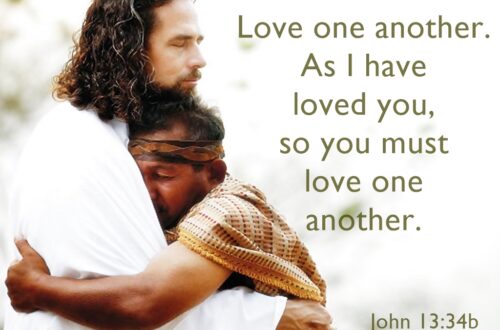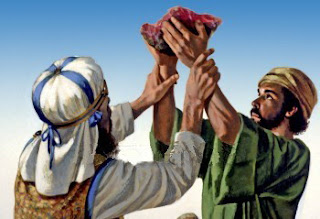Good News – Genesis 11
Gen 11 – Beyond Babel
Gen 11 – Beyond Babel
Although I’m not going to take the time to discuss it in depth, this chapter also includes the genealogy of Shem down to Abram (Abraham). According to Gen 10:25 the event of the Tower of Babel is attributed to the days of Peleg. Peleg was the 15th generation of creation. The name Peleg means “divided.” It is interesting to note that Peleg marks the start of generally much shorter average life spans (Gen 11:19). The Gen 11:27-32 genealogy gives much more detailed information about Abram’s immediate relatives and we are introduced to the setting for future chapters relating to Abraham.
Gen 11:1-9 Now the whole earth had one language and the same words. And as people migrated from the east, they found a plain in the land of Shinar and settled there. And they said to one another, “Come, let us make bricks, and burn them thoroughly.” And they had brick for stone, and bitumen for mortar. Then they said, “Come, let us build ourselves a city and a tower with its top in the heavens, and let us make a name for ourselves, lest we be dispersed over the face of the whole earth.” And the Lord came down to see the city and the tower, which the children of man had built. And the Lord said, “Behold, they are one people, and they have all one language, and this is only the beginning of what they will do. And nothing that they propose to do will now be impossible for them. Come, let us go down and there confuse their language, so that they may not understand one another’s speech.” So the Lord dispersed them from there over the face of all the earth, and they left off building the city. Therefore its name was called Babel, because there the Lord confused the language of all the earth. And from there the Lord dispersed them over the face of all the earth.
United We Stand
Mt 18:20 For where two or three are gathered in my name, there am I among them. Whether united for good or ill, there is strength in numbers. I recently read that while a lion will loose to a tiger in a one-on-one match, pitch 5 lions against 5 tigers and the lions will win. That’s because lions work together while tigers work independently. Being united is generally considered a lofty goal. The people of Babel were united (Gen 11:1-3). To unite for self service (v4) is vain and will not be tolerated (v7). When united in Christ, however, the power can do great good.
Divided We Fall
1 Cor 1:10-11 I appeal to you, brothers, by the name of our Lord Jesus Christ, that all of you agree and that there be no divisions among you, but that you be united in the same mind and the same judgment. For it has been reported to me by Chloe’s people that there is quarreling among you, my brothers. Paul warns us to be united by the name our Lord Jesus Christ. He goes on to address the divisions and for the rest of the chapter deals with the various issues resulting from division. In Mk 10:9 Jesus says, “What God has joined together, let not man separate.” We see in Genesis 11 what happens when God divides. In fact, division has caused one fall after another. There was a division between man and God in Gen 3 causing the original fall of man. Joseph’s brothers divided him off from them, then later fell on their knees before that same brother just to eat.
Language
The division of language is a unique event in history. According to Gen 11:1 everyone alive spoke the same language. This certainly makes sense. In fact, there’s no logical explanation for such incredibly diverse languages today except for what happened at Babel. There are regional dialects within many languages, but even so a person with one dialect can usually communicate effectively with another dialect of the same language. The notion that people living in relatively close proximity would develop a number of extremely different languages (such as French, German, Italian, and Russian all found in Europe) seems ludicrous. Even a person who says that Genesis is nonsense is hard pressed to explain diverse language any other way. In my mind the world’s languages of today only validate Gen 11 and by extension the whole account of Genesis.
Repairing the Damage Done at Babel
Acts 2:6 And at this sound the multitude came together, and they were bewildered, because each one was hearing them speak in his own language. Man tried to unite and make himself collectively greater than God. God has authority over all things, great and small. Just as God divided men who stood against Him, he unites men who stand with him. Those who share genuine faith in Christ receive the Holy Spirit as a deposit toward eventual eternal salvation. When the Holy Spirit came in power upon those gathered in prayer at Pentecost, the first documented outward sign was the ability to overcome the tower of Babel. The disciples spoke in languages they didn’t know, telling the Good News to foreigners who could understand them. Man was responsible for the division, but God can and will repair the damage when we don’t act against Him. It is also interesting to know that the bible we have today has been translated into more languages than any other written work in history. Again, God unites what man tries to divide allowing each to understand in his own language. The Holy Spirit does today still do these things. God hasn’t changed and neither has the Spirit. I caution the reader of this to beware, though. The subject of “speaking in tongues” is highly controversial. There is a good deal more spoken on this subject in the New Testament and the subject extends well beyond the scope of this post, so please don’t read more into it than what’s here.
The Good News of Gen 11
1 Jn 5:1-5 Everyone who believes that Jesus is the Christ has been born of God, and everyone who loves the Father loves whoever has been born of him. By this we know that we love the children of God, when we love God and obey his commandments. For this is the love of God, that we keep his commandments. And his commandments are not burdensome. For everyone who has been born of God overcomes the world. And this is the victory that has overcome the world—our faith. Who is it that overcomes the world except the one who believes that Jesus is the Son of God?
Man divides, but God unites. Man divides himself from God through sin, but God loves us enough to overcome sin and the forces of the world that seek to keep us divided from Him. It is possible to overcome this divide and unite with God. This is done through our faith. Faith is not just a prayer and not a one-time “decision.” It is a way of life where the actions of life are in harmony with the beliefs the life is based on, specifically where the belief is placed in Jesus Christ and his atoning sacrifice and the corresponding way of life is one of obedience in submission to the will of the giver of life. God is God and we are not. Not only is God happy when we accept this simple fact, but we are infinitely happier, too. Submission to our perfect loving creator is the ultimate source of joy and fulfillment. Joy from the relationship; fulfillment from the victory of overcoming and hearing that phrase: “Well done, my good and faithful servant.” You, too, can overcome the world and find the joy of experiencing God’s love as part of His family. If you’d like to know more, just ask. I don’t pretend to have all the answers, but I do know where and from whom to find them.



3 Comments
John I.
languages
Lance writes, "there’s no logical explanation for such incredibly diverse languages today except for what happened at Babel."
That statement makes no sense. There is an entirely logical explanation, one that is as assured as the fact that the earth revolves on its own axis. Languages diverge all the time, for a number of reasons. Even without Babel, there would have been thousands of new languages in the course of 4 thousand years. That God pre-empted that natural process of language diversification before it occurred, has nothing to do with that process, nor with the continued diversification of language after that point.
Furthermore, given the meanings of the Hebrew word for land, it is not necessarily the case that all the peoples in the entire globe spoke one language. It is only necessary that the people inhabiting "the land" be of one language. The land could be all of a particular geographic area. The Easton Bible dictionary (among other authorities, but at least Easton's is accessible on line) observes that "land" in the Bible can refer to or mean ". . . 3. (n.) Any portion, large or small, of the surface of the earth, considered by itself, or as belonging to an individual or a people, as a country, estate, farm, or tract. . . . 5. (n.) The inhabitants of a nation or people. . . ."
Conclusions such as that all the people on the entire globe spoke one language derive from a particular tradition of beliefs and of interpretation, rather than taking the Bible on its own terms. Not that I am suggesting that any interpreter is, or can be, free of bias. However, even though it is acceptable to start within a particular tradition, one must then recognize the existence of biases and approach the text of the Bible open to being changed in one's beliefs. This is how Luther and his contemporary reformers broke free (eventually) from Roman Catholic tradition. Similarly, those who subscribe to young earth creationist views must realize that they are in part the products of a specific tradition and not let themselves be bound to it when the Text (i.e., Bible) demands otherwise.
John I.
Lance Ponder
re – languages
John,
Once again you make interesting points, even if not about the central theme. In any case, the biblical assertion (or more specifically what I asserted the bible says) that all of humanity on planet earth spoke one common language up to Babel is based on the context of the scripture in which the assertion is made. Babel took place during the time of Peleg. Peleg was the 5th generation after Noah. The scripture says people did not disperse after the flood, but stayed in the same area. Five overlapping generations from the same family living in close proximity would have no reason to have diverse languages. The notion these were the only humans alive is based on the preceding biblical text which plainly asserts that the flood was global and Noah's family were the only survivors. The genealogies given suggest the "time of Peleg" was just over a century after the flood, though it could have been longer. I favor the shortest time just to allow for the rapid and broad dispersion of humans across the continents and the anthropological evidence of rapid movement of cultures about 4000 years ago.
John I.
diverse languages
My point still remains: we do not need Babel as an explanation for the diversity of languages; the diversity of languages can easily be explained by the nature of language (which God created). Moreover, language division is not a unique event (though the Babel event was unique). That does not mean that the Babel story is not true, on that these statements of yours are not accurate. I believe that we can derive much benefit from the Babel story without making added claims that the text itself does not make (such as the lessons about unity, etc. that you make in your post).
Your statement that "Five overlapping generations from the same family living in close proximity would have no reason to have diverse languages" is quite possible, though not necessarily true (as evidenced by the nature of language change). The only reason it is known to be true in this case (Babel) is that the Bible reports it as so.
I note also that your reasoning about language seems to be on the basis of the folk understanding of "language", rather than on the recognition that "language" is a fluid social construct (hence the old adage that "a langauage is a dialect with an army"). Languages also do not have hard boundaries, and language change can be very slow (Icelanders can still read Norse), moderate (Latin to various romance languages), or very quick (creation of creoles and pidgins). 15 – 20% of the worlds extant languages are spoken in the southeast asian islands, especially Papua New Guinea, where each village speaks a different language and is also fluent in the 3 to 4 langauges of neighbouring villages. Many languages have only two dozen or so speakers. It is not at all ludicrous to believe that people living in close proximity can have different languages.
The Babel story is not inconsistent with the history of the world's languages, but neither is it the only possible explanation for it. The world's languages would have diverged anyway, had God not caused divergence at that time (and for the particular reason stated in the Bible). Hence, because Babel is not the only possible explanation for the diversity of the world's languages, it is therefore not true that " world’s languages of today only validate Gen 11 and by extension the whole account of Genesis". We should not press the Biblical text to serve purposes and agendas that it was not meant to serve. The purpose(s) of the Babel story do not include proving that the Bible is historically accurate or true. Rather, we believe that the Bible is true because we trust Jesus and so accept the truth of His scriptures, which Paul tells us are God-breathed. The meaning and purpose of the Babel story lie in its relationship to Jesus, and to God's ongoing relationship with humanity.
In response to your further comment, I do not agree that "the preceding biblical text which plainly asserts that the flood was global and Noah's family were the only survivors". Rather, I believe that the text clearly and plainly asserts something quite different, but that is a subject for another time.
regards,
John I.